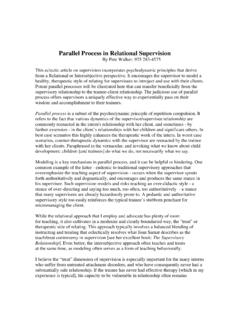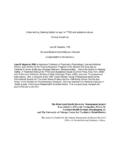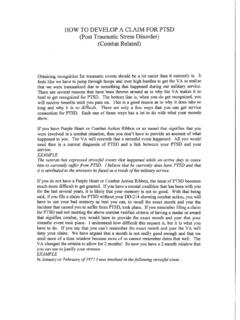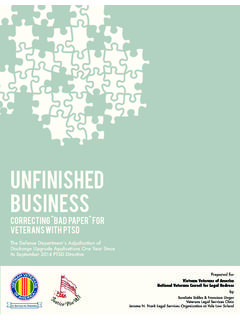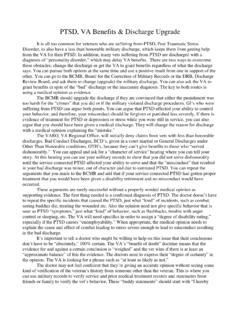Transcription of Emotional Neglect and Complex PTSD By Pete Walker
1 Emotional Neglect and Complex ptsd . By Pete Walker This article highlights the prodigious role that Emotional Neglect plays in childhood trauma, and how it alone can create Complex ptsd . It begins by extensively examining the processes of denial and minimization that blunt our awareness about childhood trauma. Denial is first explored in relationship to abuse, especially verbal and Emotional abuse, which then sets the stage for a more complete explication of the trauma of Emotional Neglect . Denial about the deleterious effects of childhood abandonment seriously delimits our ability to recover. Continuous Emotional Neglect turns the child's psyche into a quagmire of emptiness, fear and shame - a quagmire that she will, as an adult, frequently flashback into until she understands and works through the wretchedness of her childhood. Without such understanding, her crucial, unmet needs for safe and comforting, human connection will continue to cause her an enormous amount of unnecessary suffering.
2 Denial and minimization. Recovery from ptsd correlates with an individual's ability to understand on deep impactful levels how derelict her parents' were in their duty to nurture and protect her. The individual needs to get that Emotional flashbacks are direct messages from her child-self about how seriously her parents hurt and injured her. As denial is significantly deconstructed, the recoveree feels genuine compassion for the child she was. This in turn motivates her to engage the healing process of identifying and addressing the specific wounds of her childhood. Over time she becomes aware of her specific abandonment picture and the pattern of physical, spiritual, verbal and Emotional abuse and/or Neglect that she experienced. [Chapter 8 of my book, The Tao of Fully Feeling, provides guidelines for assessing your particular pattern]. Confronting denial is no small task. Children so need to believe that their parents love and care for them, that they will deny and minimize away evidence of the most egregious Neglect and abuse.
3 De-minimization is a crucial aspect of confronting denial. It is the process by which the individual deconstructs the defense of making light of his childhood trauma. The lifelong process of de- minimizing the impact of childhood trauma is like peeling a very slippery and caustic onion. The outer layer for some is the stark physical evidence of abuse, , sexual abuse or excessive corporal punishment. In a perversely ironic way, my parents'. physical abuse of me as a child was a blessing for it was so blatant that my attempts to suppress, rationalize, make light of and laugh it off lost their power in adolescence, and I was able to see my father for the bully that he was. [Seeing my defensively idealized mother's abusiveness came much later]. Identifying my father's behavior as abusive eventually helped me become aware of less dramatic aspects of my parents' oppression, and I subsequently discovered the verbal and Emotional abuse layer of the onion of my childhood abandonment.
4 Verbal and Emotional Abuse. The fact that verbal and Emotional abuse can be traumatic is lost on many childhood trauma victims. Many never learn to validate its crippling effects. They never accurately assign current time suffering to it. Attempts to acknowledge it are typically blindsided with thoughts that it was nothing compared to kids who were repeatedly beaten who had it worse. Yet for me, and many of my clients, verbal and Emotional abuse was much more injurious than our physical abuse. Being ongoingly assaulted with critical words systematically destroys innate self-esteem and replaces it with a prevailing consciousness of toxic self-criticism. Even worse, words that are emotionally poisoned with contempt [a deadly cocktail of intimidation and disgust] infuse the child with fear and toxic shame respectively. Fear and shame condition him to refrain from asking for attention, from expressing himself in ways that draw attention, and before long from seeking any kind of help or connection at all.
5 Unrelenting criticism, especially when it is ground in with parental rage and scorn, is so injurious that it changes the structure of the child's brain. Here is a theoretical model of this. Repeated messages of disdain are internalized and adopted by the child, who repeats them over and over to himself. Incessant repetitions result in the construction of thick neural pathways of self-hate and self-disgust. Over time a self-hate response attaches to more and more of the child's cognitions, feelings and behaviors. Eventually, any inclination toward authentic or vulnerable self-expression activates internal neural networks of self-loathing. The child is forced to exist in a crippling state of self-attack, which eventually becomes equivalent to a state of full-fledged self-abandonment. The ability to support or nurture himself or take his own side in anyway is decimated. With ongoing parental reinforcement, these neural pathways expand into a large Complex network that becomes an Inner Critic that dominates mental activity.
6 This critic elaborates myriad programs of self-rejecting perfectionism and paints the psyche with the endangerment scenarios that I describe in my articles on Shrinking The Critic . Until these programs are effectively deconstructed, the individual typically lives in varying degrees of Emotional flashback much of the time. 1. The verbal and Emotional layer of the abuse onion has myriad sub- layers of minimization which must be confronted in the long difficult disengagement of one's identity from the toxic critic. I. have heard clients jokingly repeat numerous versions of this over and over: I know I'm hard on myself, but if I don't constantly kick my own ass, I'll be more of a loser than I already am.. A childhood rife with verbal and Emotional abuse often creates an identification with the critic that is so pervasive, that it is as if the critic is the whole identity. Disidentification from the critic is the fight of a lifetime, and for a long time there is a great pull to collapse back into the old habit of self-blame.
7 Ironically this self- hate can constellate around the self-judgment that one is especially defective because she cannot simply banish the critic. [Typical toxic, all-or-none thinking from the critic]. Sadly, many survivors give up before recognizing the myriad subtle ways the critic tortures them. Yet, there is no more noble recovery battle than that which gradually frees the psyche from critic dominance. Until this happens to a significant degree, there is minimal development of the healthy, user-friendly ego. Let us look now at how Emotional Neglect alone creates a psyche- dominating Critic. Emotional Neglect : The Core Wound in Complex ptsd . Minimization about the debilitating consequences of a childhood rife with Emotional Neglect is at the core of the ptsd denial onion. Our recovery efforts are impeded until we understand how much of our suffering constellates around early Emotional abandonment . around the great emptiness that springs from the dearth of parental loving interest and engagement, and around the harrowing experience of being small and powerless while growing up in a world where there is no-one who's got your back.
8 Many survivors never get to discover and work through the wounds that correlate with this level, because they over-assign their suffering to overt abuse and never get to the core issue of Emotional abandonment. As stated above, this is especially true when they dismissively compare their trauma to those who were abused more noticeably and more dramatically. [This is particularly ironic in light of the fact that some individuals can suffer a modicum of active abuse without developing ptsd , if there is one caretaker who does not emotionally Neglect them]. Traumatic Emotional Neglect occurs when a child does not have a single parent or caretaker to whom she can turn in times of need or danger, and when she does not have anyone for an extended period of time who is a relatively consistent source of comfort and protection. Growing up emotionally neglected is like nearly dying of thirst just outside the fenced off fountain of a parent's kindness and interest.
9 Emotional Neglect makes children feel worthless, unlovable and excruciatingly empty, with a hunger that gnaws deeply at the center of their being, leaving them starving for human warmth and comfort - a hunger that often morphs over time into an insatiable appetite for substances and/or addictive processes. [I. find it noteworthy that denial processes about early abandonment often morph later in life to the minimizing operations that some survivors use to rationalize their substance and process addictions. While addictions are often understandable, misplaced attempts to regulate painful Emotional flashbacks, they become increasingly self-destructive when an individual is old enough to learn a healthier flashback management regimen. Accordingly, excessive eating, spending, drinking, drugging, sexing, working or dissociating, are not only desperate attempts to distract from inner pain, but also counterproductive efforts to attain an ersatz form of human comfort and soothing.]
10 And while many recoverees eventually come to see their substance or process addictions as problematic, many also minimize their deleterious effects and jokingly dismiss their need to end or reduce their reliance on them.]. The Evolutionary Basis of Attachment Needs The human brain evolved during the Hunter-Gatherer era that represents of our time on this planet. Children's vulnerability to predators caused them to evolve an intense, instinctual fear response to being left alone without protection. Fear hard-wired in the child as a healthy response to separation from a protective adult, and linked automatically to the fight response so that the infant and toddler would automatically cry angrily for attention, help, cessation of abandonment - even at the briefest loss of contact with parental figures. Beasts of prey only needed seconds to snatch away the unprotected child. In present time dysfunctional families, many parents disdain children for needing their attention.

